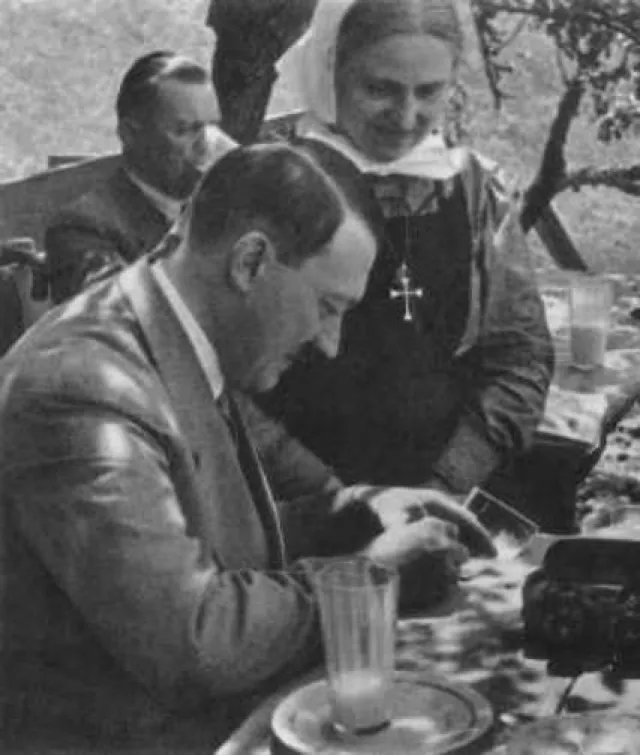HTT_8_5-1-14_0.mp3
(12.97 MB)
May 1, 2014
Carolyn Yeager and Ray Goodwin read and comment on the October 13-14, 1941 dinner table monologues by the German leader, as taken down by a trusted adjutant.
- Economic opportunities in the East for all Northern European people;
- Lunacy of First World War High Command;
- How Hitler makes wise use of his time;
- Disadvantages of a Concordat with the Churches;
- More thoughts on Christianity.
The edition of Hitler's Table Talk being used was translated by Norman Cameron and R.H. Stevens, published by Enigma Books, New York, and can be found as a pdf here.
- 4894 views






Here we have proof that
Markus
Here we have proof that Hitler didn't "hate the Slavs and was out to conquer them". Connecting the Black Sea to the Oder River would have brought prosperity to the average Ukrainian And unite the Western and Eastern Europeans. The Ukrainian would also live without Jewish interest slavery and without Marxist harrasment or Eurasian empirialism. Occassional comments on the different nature of the Slav (or Italian or Hungarian) is normal and non-German Whites make comments about the German or Germanic people, as well. Does that mean they hate Germans? I don't think so, in general.
We also read Hitler's stance on Christianity, religion and spirituality.
This was a good show with excellent commentary, Carolyn and Ray.
In this episode we learn that
Rick
In this episode we learn that unlike dictators like Mao Zedong, Hitler was not trying to build a cult of personality around himself and disdained the idea of being worshipped like a diety. This contradicts claims that Hitler was some sort a pathological megalomaniac. We also hear more about Hitler's views on religion, which he seems to grasp much more clearly than Marx ever did. Hitler shows a respect for science and natural law which is not dissimilar from Teddy Roosevelt. Ray has one of the best reading voices I have heard and Carolyn's enthusiam and uplifted spirit makes "Hitler's Table Talk" a pleasure to listen to.
Table Talk Episode 8
Sven Longshaks
Unless Hitler had a complete character transplant I dont think they were his words at all there when referring to religion. They contradict everything else he ever said about it, which was always reverential and included lots of references that you would only get if you were well versed in Christianity.
Whoever it was that wrote that was a Christ hater and could not help showing it in their choice of words used. I dont think it possible that someone who had such a deep understanding of the Bible that it showed in the language they used when talking about completely different subjects, would suddenly change to using the sort of language anti christs use.
Unless Hitler was a charlatan and a fraud, then I dont think those bits can have been spoken by him.
Reply to Sven
carolyn
You need to read what Hitler said more carefully. It is October 14, 1941, midday in the TT. Nowhere does he say anything anti-Christ. He speaks against the Churches and against Christianity as an institution, and also as a dogma. Hitler did not see any of this as being instituted by Jesus Christ during his lifetime but by Paul and those that came after him. In the early days (1920's) Hitler liked to portray Christ as a fighter, that is, a man ... although he did call him "our Lord" and "my Lord". But in the thirties he did not say that anymore.
Yes, he read the bible, especially the parts about Jesus, but plenty of other parts too. He read everything that interested him and he was surely interested in the religion of his people. As a youth he would have read it out of curiosity, because the Catholics did not encourage bible-reading.
Notice he said: "Consequently, the more Christianity clings to its dogmas, the quicker it will decline." Meaning that the dogmas of the Church were meant to keep the folk from thinking [for the purpose of retaining influence over them], which would drive more and more of them away as science advanced. It was nothing against Christ himself, but against the organized institution and it's desire to be greater than the State.
Hitler wanted power. He believed in the power of the State acting in the interests of the folk. He wanted a unified State that could exercise authority and act with strength. The Church wanted the same thing for itself and at times challenged the authority of the State. Even in that time [1940's] the Churches were much more powerful than now, with great influence over the folk.
You, Sven, are not thinking in the larger terms that Hitler thought in.
I dont dispute any of what
Sven Longshaks
I dont dispute any of what you said Carolyn, just the fact that the choice of words used do not sound at all like ones he likely would have used, based on all his previous writings and speeches. There may be some loss in translation, but not as much as that, and why never a loss in trasnlation like that before? I think those bits were deliberately altered to suit the publishers own agenda.
I disagree ...
carolyn
Ray and I have both remarked how much Hitler sounds like himself in all of this. As I pointed out in this episode, he is speaking privately whereas in what you are talking about is his public speech
It doesn't make him a hypocrite to not say in public what he says in private to an inner circle of those he trusts to keep it to themselves. He was by necessity thinking what was best for the German nation at that time. I put forth my own best arguments that Hitler was a Christian in this radio podcast I did filling in for Bill Finck. http://carolynyeager.net/christogenea-radio
I was sincere in putting forth this research, which is accurate. I don't think I'm a hypocrite either.
I am sure you are sincere
Sven Longshaks
I am sure you are sincere Carolyn, its just that the style of wording used was atheist and not Christian. It really did sound to me like the author had suddenly changed. I may go back over it so I can be more specific if I get the time at some point.
Bormann
Richard
You might recall that Hitler did not write it but it was recorded and then verified by Martin Bormann. Bormann was known to be anti-slavic and anti-clerical. It would show in the writings. On another note, Irving asked the publisher to see the original writings so that he could verify what was written to what was published and the publisher refused to allow him access. Why I wonder.
Now if Hitler was anti christian why would he allow "God with us" as the Nazi motto on the military belt buckles.
Richard ...
carolyn
God does not equal Christian. This is so obvious but many people make this mistake. Hitler always spoke against atheism and affirmed his belief in God, or an almightly benevolent Power, often calling it Providence. In TT he was referring to the Christian Church, Christian dogma ... not "God."
Hitler mentioned his distaste
Markus
Hitler mentioned his distaste for multiculturalism in his state's capitol, Vienna, the federal center of the multi-ethnic empire in Mein Kampf already. At the same time, Hitler-Germany allied with Slovakia, Croatia, he protected Czechia from becoming a Soviet satallite state. Hitler had Poland on his side until 1935 and even attempted friendship with the world view enemy #1, Soviet Union, or Russia.
The question is not whether Hitler or Germans were anti-Slavs, but whether various Slavic leaders and populations were anti-German. They definetely showed their hatred for us after 1945 and expelled all of us from Central and Eastern Europe. Any apologies? Any remorse? Nah...
Gott mit uns was on the soldiers' belts in WW1 also. Atheism (a=against God) was always Hitler's horror, for it is the Jewish world view, either through Judaism or Communism. Furthermore, Hitler installed Deutsche Christen, a German-centric church, somewhat comparable to the Greek or Russian orthodox church or Anglican church. It is pretty clear that Hitler didn't like the liberal interpretations of the Evangelicals, where there is no national outlook attached to its sermons and the Catholic church is literally a foreign entity and therefor a constant threat, depending how well the pope likes your politics.
I have yet to hear Hitler attacking Christian values or traditional partnerships etc. His criticism of religion therefor is justified.
Hitler was very aware that
Malema
Hitler was very aware that the universalist, race-mixxing, anti-nature message of Christianity was a danger to Western society, The NS ideology put the survival of our people and civilisation as the most important goal to be achieved.
You keep covering the Table
Antiochus Epiphanes
You keep covering the Table Talk.
How about covering Hitlers official works ?
You are deliberately misleading people on
Hiter's official positions ?
Why is